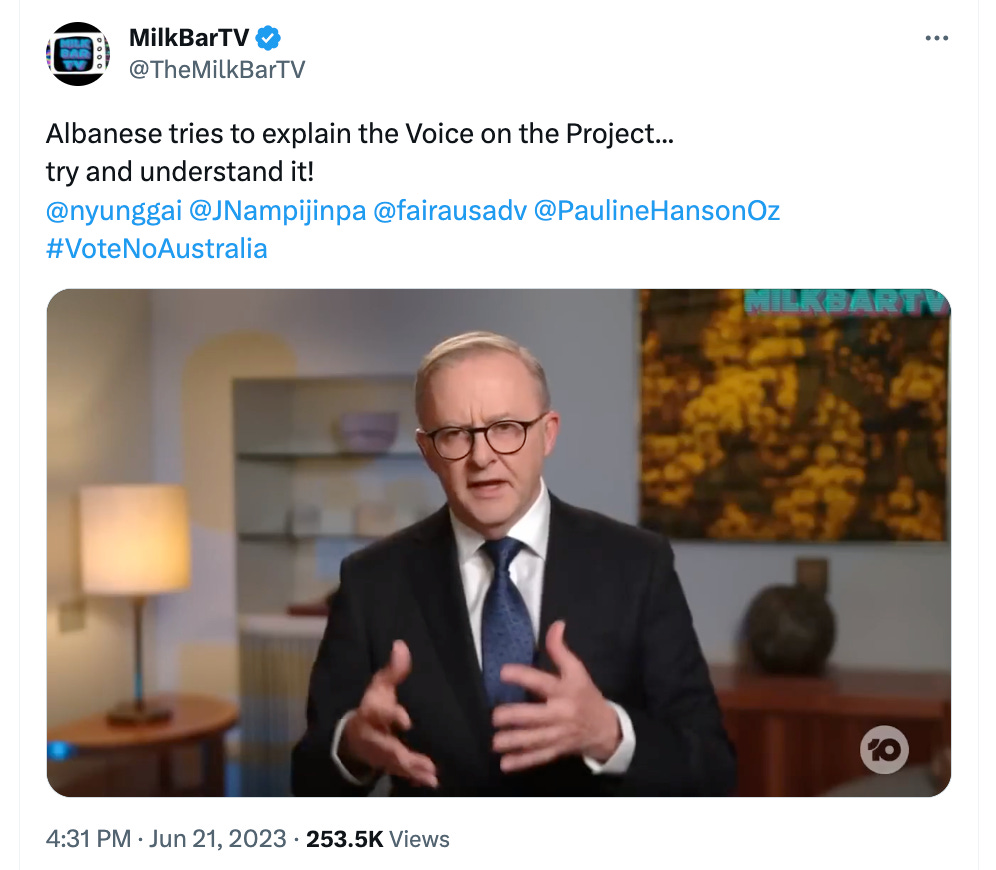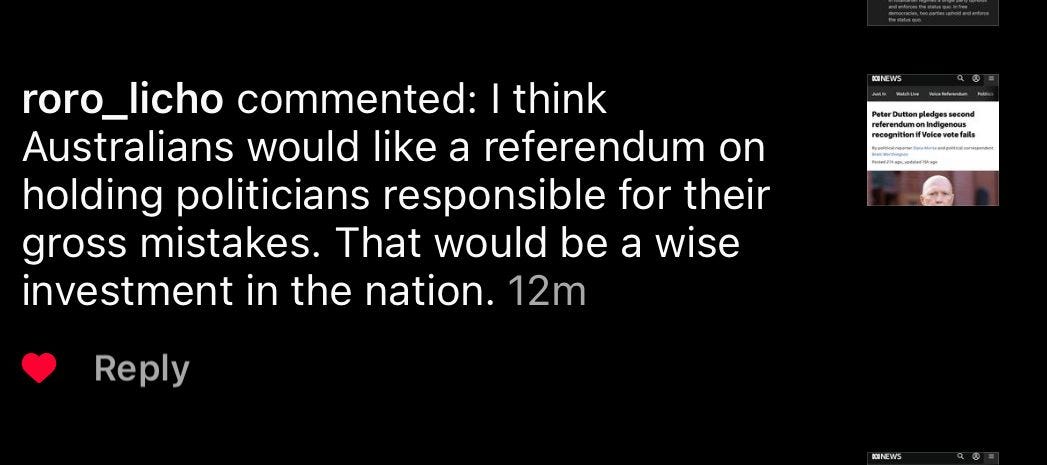Disinformation campaign fails to bolster support for Australia's Indigenous Voice to Parliament
It's the Voice, try and understand it!
New polling commissioned by The Australian shows that support for a constitutionally enshrined Indigenous Voice to Parliament continues to fall, with the No vote now taking the outright majority at 53 per cent, compared to 38 per cent intending to vote Yes.
With the exception of young voters (18-34) and those with a University education, the No vote holds the majority of every demographic in the lead up to the national referendum, which will be held on 14 October this year.
The latest polling results reveal a continuation in the trend away from Yes and towards No as campaigning for the Voice referendum has progressed. At last polling in July, I suggested that this was largely the fault of the Yes campaign, which appeared to be self-sabotaging at every opportunity with moralising, tokenistic celebrity allyships, inarticulate waffling, doublespeak from within its ranks, and playing down legitimate concerns as either irrelevant or ‘fear mongering.’
Instead of changing tack, the Yes campaign has since doubled down, with a cringeworthy disinformation campaign over whether the referendum’s guiding document, the Uluru Statement from the Heart is one page or 26 pages long in its entirety.
It started when the No campaign and conservative commentators pointed out that the full 26 pages of the Uluru Statement documentation provided important context to the core single page statement, context which they believed was being omitted from the public discourse about the referendum.
In one of the most ludicrous displays of political pettiness in recent history, Prime Minister Anthony Albanese (who is leading the Yes campaign) responded by likening this claim to a Q Anon conspiracy theory or the faking of the moon landing, spawning a spate of media coverage on the conspiracies of the No campaign, and RMIT FactLab labelling the claim as ‘false.’
(Click here to see Rukshan Fernando’s post)
Subsequent investigative reporting by Jack Houghton for Sky News revealed RMIT FactLab to be compromised, abusing their position as Meta-affiliated fact checkers to conduct political activism for the Yes campaign. Meta swiftly cut them loose, suspending their partnership.
The full document is 26 pages long: a core one page statement with 25 accompanying pages providing context. In a sense, both sides were right and the disagreement was a matter of nuance. This is a normal feature of public discourse, and should have spurred earnest discussion about why the Yes campaign thought only the single page statement mattered, and why the No campaign was concerned about the other 25 pages.
But to suggest that one side of this disagreement was engaging in Q Anon-type conspiracy theories is pure disinformation (i.e.: deliberately misleading). Igor Chudov covered the whole dumb episode from start to finish on his Substack over the weekend, which you can read here.
This hoo-ha encapsulates why the Yes campaign keeps losing support. They keep showing themselves to be petty game players who prefer asinine semantic theatrics over genuine discourse - and by ‘they’, I mean the main public figures, not the well meaning activists on the ground who are campaigning for the cause in good faith.
I have just finished a round of interviews with Australians of immigrant backgrounds who shared with me on how they intend to vote, and why (article in progress). I have also been keeping a keen eye on the comments in past posts about the Voice.
I have found that soft Nos and undecided voters typically have an emotional pull towards Yes, but their reservations are to do with logical considerations such as legal implications, governance structures, and the competence of the government in delivering the promised outcomes.
Quite obviously, petty disinformation campaigns like the above confirm to undecided and soft No voters that their reservations are warranted.
To provide balance, we should acknowledge there have been accusations of conspiracy on both sides.
A couple of weeks ago, the Australian Electoral Commission announced that it will accept both the word ‘yes’ and the tick symbol for a Yes vote, but will not accept a cross symbol for a No vote. The No campaign has been up in arms over it, as they say this will stack the deck in favour of Yes. That may be so, but the AEC says this rule has been in place for decades, so it seems to be an accident of pre-determined process, not a conspiracy to advantage the Yes campaign.
(see former Liberal MP Craig Kelly’s post here)
There are key two differences between Albo’s and Kelly’s respective conspiracy claims. Albo’s seems a pretty clear cut case of disinformation. He of all people knew the full document was 26 pages, he deliberately mischaracterised the document as a single page, and he engaged in straw man tactics in an effort to discredit the opposing side. Kelly’s tweet appears to be misinformation, although his reference to the AEC palava over font size indicates that he has good reason to arrive at this conclusion, as AEC processes have arguably been weaponised against him in the past - notably, Kelly won against the AEC in court over this issue.
In other news, Australian music legend John Farnham has given his iconic anthem You’re the Voice to the Yes campaign. Great song, although some have questioned why the Yes campaign chose a song by a white guy over music by a member of the Indigenous community.
The news has also spawned some amusing memes referencing Albo’s difficulty in explaining what the Voice actually is. It’s the Voice - try and understand it!
(Click here to watch MilkBarTV’s 40 sec video)
Meanwhile, opposition leader and leader of the No campaign, Peter Dutton, has vowed to hold a second referendum on Indigenous recognition if the No vote wins the 14 October Voice referendum. This is clever politics in my estimation, as it gives undecided and soft No or Yes voters a backstop if they are pro-constitutional recognition, but leery of enshrining an ill-defined advisory body permanently into the constitution.
The Voice referendum asks a double-barrelled question: do Australians want to recognise Aboriginal and Torres Strait Islanders in the constitution, and do they agree that this will be done by enshrining an Indigenous Voice to Parliament in the constitution (see the question and the proposed wording of the constitutional amendment here). Dutton’s proposed referendum will only ask the first question.
The Voice is significantly different from constitutional recognition on its own because the Voice is part of the process of Voice, Treaty, and Truth, as stated eloquently by Professor Megan Davis, Cobble Cobble woman and key spokesperson for the Uluru Statement from the Heart and the Yes campaign. Speaking at a Human Rights Oration in a speech called ‘Towards Treaty’ in 2018, Davis said,
“Uluru was a sequence reform: Voice to the Parliament first, Treaty second… Treaty has always been the primary aspiration… Treaties… involve a redistribution of political power. Treaties are about reparations for past injustices, and they are about land, and they are about resources.”
(Watch the video here via my X post here)
In taking the Voice aspect of the referendum off the table, Dutton lowers the stakes for nervous voters who are not so inclined to commit to a process of Treaty without more information about what that will entail. Dutton says that constitutional Indigenous recognition has been a longtime policy of the Liberal Party. However, ABC News points out that, “Despite taking the policy to elections and being in power between 2013 and 2022, the Coalition never held a referendum on Indigenous recognition.” Credit where credit’s due - it’s uncertain how long the Liberals would have fluffed around on the issue without Albo getting the ball rolling on this one.
Aussies, if the Voice referendum does not succeed and Dutton’s second referendum goes ahead, how will you vote, Yes or No?
Best comment on social media:
Further reading from the DDU archives:
Support for the Voice is failing: Blame it on the Yes campaign
Tech giant Meta to 'safeguard' Australian referendum integrity, arbitrate truth
The Voice: An immigrant's perspective
Is the Voice to Parliament a Trojan Horse?
RED FLAG 🚩 Pfizer advocates for constitutional change in Australia
To support my work, make a one-off contribution to DDU via my Kofi account and/or subscribe. Thanks!








I mentioned the word “Makaratta” to a few University-educated types the other day at the office, asking them what it is. They’d never heard of it, nevermind that it’s mentioned at least twice on the Uluru Statement “1-pager” that’s actually 26 pages. It’s the “treaty” commission that comes after the Voice is enshrined, and will set off all manner of reparations, separate development and other UN-inspired horrors that will divide and enthrall the nation. The idea that the “Voice” ends in some sort of idyllic recognition of symbolic unity and utopia is so laughable, but the average normie quite literally has absolutely no idea what any of this is about, but they get to pat themselves on the back by reminding each other just how virtuous and amazing they are for caring about aboriginals because they truly swallow every bit of mainstream bullshit imaginable.
A few months back I wrote to the Australian Electoral Commission inquiring whether we will be voting on between John Farnham' The Voice and Yothu Yindi's Treaty, I got a serious but bemused reply!